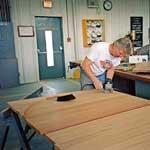- Posts: 6722
- Thank you received: 72
Is this hurricane about to hit New York?
- Wayne Harrison
-

- Mountain Legend
-

http://news.blogs.cnn.com/2011/08/26/li ... ?hpt=hp_t1
If you read RSS feeds, you can subscribe: http://news.blogs.cnn.com/feed/
And, they've closed down all Broadway shows...
Also, there's no truth to the rumor that Apple bought the hurricane and renamed it iRene.
Please Log in or Create an account to join the conversation.
- archer
-

- Mountain Legend
-

- Posts: 9964
- Thank you received: 8
Please Log in or Create an account to join the conversation.
- CinnamonGirl
-
 Topic Author
Topic Author
- Visitor
-

Please Log in or Create an account to join the conversation.
- ScienceChic
-

- Mountain Champion
-

- Posts: 15746
- Thank you received: 320
Hurricane Irene, Climate Change, and the Need to Consider Worst Case Scenarios
Chris Mooney
25 August 11
In May of 2005, a few months before Hurricane Katrina, I wrote an article that nobody noticed. It was entitled “Thinking Big About Hurricanes: It’s Time to Get Serious About Saving New Orleans.” Afterwards, the article was passed around furiously and I was hailed for having some sort of deep insight. I didn’t: The danger was staggeringly obvious and I was only channeling what many experts at the time knew.
With all eyes now focused on Hurricane Irene, which threatens a series of U.S. east coast landfalls, it is time to think seriously once again about worst case scenarios—and also, about how global warming could amplify them. And no, I am not saying that Irene threatens to bring about a worst case, that global warming caused Irene, or taking any other silly reductionist position. Rather, I’m saying that Irene focuses our attention on our serious vulnerability, and we need to seize that moment--because too often our default position is to act like nothing bad is going to happen. There are several places in the United States, besides New Orleans, where a strong hurricane landfall could be absolutely devastating. So I am not forecasting anything about Irene--I'm just saying it's time to look at worst cases in general.
What's the worst case for New York City, as the world warms and sea levels rise? Here's what I wrote in my 2007 book Storm World :Even as we act immediately to curtail short term vulnerability, every exposed coastal city needs a risk assessment that takes global warming scenarios into account....Scientists at the NASA Goddard Institute for Space Studies in New York have been studying that city's vulnerability to hurricane impacts in a changing world, and calculated that with 1.5 feet of sea level rise, a worst-case-scenario Category 3 hurricane could submerge "the Rockaways, Coney Island, much of southern Brooklyn and Queens, portions of Long Island City, Astoria, Flushing Meadows-Corona Park, Queens, lower Manhattan, and eastern Staten Island from Great Kills Harbor north to the Verrazano Bridge.” (Pause and think about that for a second.)
We live in a presentist country that rarely pays attention to long term risks or worst case scenarios, until it is too late. When it comes to hurricane disasters in particular, rising sea levels make the risk steadily worse over time, whether or not hurricanes themselves get much stronger.
So what are our major coastal cities doing to protect themselves? That’s the question we should all be asking right now.
"Now, more than ever, the illusions of division threaten our very existence. We all know the truth: more connects us than separates us. But in times of crisis the wise build bridges, while the foolish build barriers. We must find a way to look after one another as if we were one single tribe.” -King T'Challa, Black Panther
The truth is incontrovertible. Malice may attack it. ignorance may deride it, but in the end, there it is. ~Winston Churchill
Please Log in or Create an account to join the conversation.
- CinnamonGirl
-
 Topic Author
Topic Author
- Visitor
-

http://hotair.com/archives/2011/08/26/h ... orecaster/
o The demise of Irene has already begun. There is no visible eye. The storm intensity is down to 99 mph. This would be a low-end category 2 or a strong category 1 storm, while 36 hours ago some predicted a catastrophic category 4 storm. Air Force Reserve aircraft have found that Irene’s eyewall has collapsed, and the central pressure has risen — rising pressure means a weakening storm.
o The reduction in storm intensity likely confirms that this storm is not going to be as monstrous as it has been publicly forecast to be.
o Yes, it will be windy. However, north of Delaware most hurricane force winds will very likely be gusts, not sustained winds…
o Our internal modeling uses genetic algorithms to emphasize the weaknesses of storms. Remember that storms are energy. Just like people, they all have their own personalities. From the get-go, Irene was not a power storm. Her goal was to become wide, not internally powerful. Personified further, the storm became too big too quickly and it cannot master its own strength.
Please Log in or Create an account to join the conversation.
- jf1acai
-

- Mountain Legend
-

So what are our major coastal cities doing to protect themselves? That’s the question we should all be asking right now.
Regardless of your views regarding global warming, that is what we should be asking now, and also about our own area, with its own risks.
IMO, we should all do more to be better prepared for both natural and man made risks, and I don't think any of us can do it alone. We need to work together as a community, utilizing all our strengths, and minimizing all our weaknesses.
I think 285Bound, and the other affilliated Bound sites, are a good step in that direction.
The government can never protect us from everything, we have to take some responsibility for ourselves, and work within our own communities to do the best we can.
Experience enables you to recognize a mistake when you make it again - Jeanne Pincha-Tulley
Comprehensive is Latin for there is lots of bad stuff in it - Trey Gowdy
Please Log in or Create an account to join the conversation.
- CinnamonGirl
-
 Topic Author
Topic Author
- Visitor
-

Please Log in or Create an account to join the conversation.
- Rockdoc
-

- Mountain Legend
-

jf1acai wrote:
So what are our major coastal cities doing to protect themselves? That’s the question we should all be asking right now.
Regardless of your views regarding global warming, that is what we should be asking now, and also about our own area, with its own risks.
IMO, we should all do more to be better prepared for both natural and man made risks, and I don't think any of us can do it alone. We need to work together as a community, utilizing all our strengths, and minimizing all our weaknesses.
I think 285Bound, and the other affilliated Bound sites, are a good step in that direction.
The government can never protect us from everything, we have to take some responsibility for ourselves, and work within our own communities to do the best we can.
Agreed. I do believe we will have our opportunity to test a community resourcefulness not because of natural calamity, but because of manifest global economic failure next year. While some will never act until forced to react, there are a group here who are preparing now for what we expect will materialize. Personally, I'd rather be prepared and ready for the worst. If nothing happens, then others can laugh, but nothing done will go to waste either way. Furthermore, the act or preparation will strengthen community bonds. Again a win win situation.
As for low-lying areas such as the city (NYC), nothing substantial will get done until sea level rises another foot and even spring tides bring flooding. It's just the nature of the beast for most to ignore or explain away impending issues.
Please Log in or Create an account to join the conversation.
- Wayne Harrison
-

- Mountain Legend
-

- Posts: 6722
- Thank you received: 72
Please Log in or Create an account to join the conversation.
- Rockdoc
-

- Mountain Legend
-

WayneH wrote: BTW, THANKS! for not merging VL's hurricane stuff with this thread.
Please Log in or Create an account to join the conversation.








